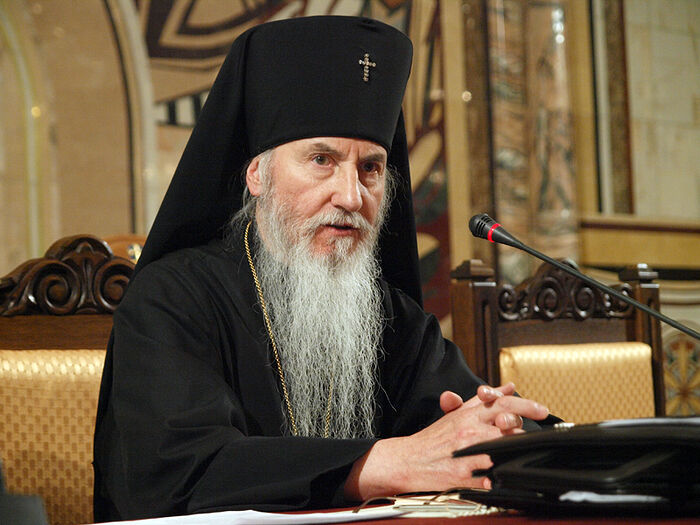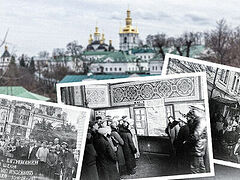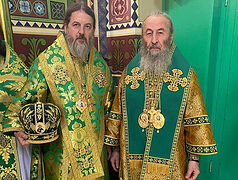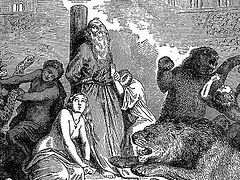Metropolitan Mark (Arndt) of Berlin and Germany shared his perspective on the current events taking place right now in the Kiev Caves Lavra and in the Church of Ukraine as a whole. His stance is, in my opinion, particularly valuable since he is, if I may say so, on the “spiritual warfront”. A large number of refugees from Ukraine have found refuge in his diocese, and so Vladyka sees it with his own eyes and takes it all close to his heart. –
—Vladyka, how would you describe what is happening right now in the Kiev Caves Lavra and with the Church in Ukraine as a whole?
The only canonical Orthodox Church in the country is being persecuted there
—The country’s only canonical Orthodox Church, to which belong the majority of believers in Ukraine, is being persecuted there. What is happening at the Lavra is the most striking manifestation of the current situation. The authorities are threatening to expel the monks from the monastery. For the moment, the brethren remain in the lower part of the monastery, but they have government orders on hand to vacate the premises. Yet, no matter what happens in the future, the monks are not going to do it voluntarily, as far as I know.
—Is it possible to call what is happening now in the monastery the apotheosis of the persecution of the Ukrainian Orthodox Church as a whole?
—Yes, this is yet another step in the persecution of our Church.
—You are in close contact with His Beatitude Metropolitan Onuphry and the brethren of the Lavra. What do they say about the current developments?
—I haven't called them in a while. Frankly, I am afraid a call made from Germany or any other country might hinder our interaction with the Church in Ukraine. They are being persecuted for their association with the Moscow Patriarchate, so at the moment anything that sounds or smells “a la Moscow” is being persecuted in Ukraine.
The Ukrainian government is trying in every way to show that they have nothing in common with Russia. But this is madness, because the Ukrainian culture in its entirety is intimately connected with Russia and the Russian culture.
The Ukrainian culture in its entirety is intimately connected with Russia and the Russian culture
—In your opinion, Vladyka, what risks do you see in the current situation?
—The danger is not only that the Church in Ukraine will be ignored, but also that there will be attempts to destroy it completely.
—Don't you think that by trying to take the Kiev Caves Lavra away from the Church, the conflict is approaching—or has already reached—the goal conceived by its instigators: an attempt to divide and weaken the Church, which perhaps more than anything else in the world continues to adhere to fundamental Christian principles?
—Yes. Naturally, it is an attempt to destroy something that allows us to maintain the accepted ethical norms. The Kiev Caves Lavra has been preserving these spiritual fundamental concepts for a thousand years. And those people who are currently in power in Ukraine are clearly trying to destroy them.
—And who benefits from this?
—The devil. Obviously, there is no other stakeholder. This is being sought by those who are ruled by the devil, and their goal is to destroy the spiritual bonds of the nation.
—The monks and parishioners of the Lavra probably face a choice: either to seek a compromise and switch to the schismatics in order to at least preserve the Lavra in some way, or to stand to the end and probably accept a martyric path. How do you think the situation will develop?
—I think that for the most part, they will not seek any compromise in any way, because it is a question of “to be or not to be”. The very existence of the Church is at stake here, or about becoming part of a certain organization that has nothing to do with the Church, and it is precisely destroying the [country’s] spiritual foundations.
—A lot of refugees from Ukraine have arrived in your German diocese, including both the clergy and laity. How do they treat the events taking place in their homeland, in the Lavra and the Church, in general?
—They are here, in part, because they don’t agree with what is going on in the Church life there. Certainly, in some measure, they have left their homeland because of the war that is raging there. But that’s just what lies on the surface. On the inside, everything is much worse, because what is actually happening there is the destruction of the spiritual foundations of the Church and the state.
The spiritual foundations of the church and state are being destroyed
—Speaking of spiritual foundations... Last February, a few days after the beginning of the military phase of the conflict, you sorrowfully said that once the war ends, it will be necessary to restore the connection between the Russians and the Ukrainians; and then you said something that shook me to the core: “Assuming there is still anything left to restore.” You meet both Russians and Ukrainians on a daily basis. Do you believe there is something we can restore, and that we will be able to do it?
—I think so, because overall, this is not a war between the peoples. This is the war between the leaders who started it. Those Ukrainians who are here in Germany treat things that are happening back home differently. Some of them aren’t ready to give up their Russian culture. After all, it existed for centuries as an All-Russian culture, while such a concept as “Ukrainian culture” has only emerged in the last two hundred years or so.
—Here it is appropriate at last to remind people that you are speaking not only as the hierarch of the Russian Orthodox Church Outside Russia, but also as an expert, who defended a doctoral thesis on Old Russian literature.
—Yes, that’s right.
We’ve never seen any difference between the Ukrainians and Russians. It simply never existed before
—What do you think we need to do in order to restore that unity?
—We need a peaceful, calm and spiritual solution, where we avoid confrontation and accept the historical facts. What this means is we have to understand and accept the historical unity of the two peoples. This is the unity based on the spiritual foundation. For thousands of years, the Russian and Ukrainian peoples were a single whole. In our Russian Orthodox Church Outside Russia, we never made a distinction between the Ukrainians and the Russians. It simply never existed. Moreover, it should be noted that, for many centuries, the Ukrainians have held leading positions in the Russian Church. A large number, if not the majority, of hierarchs came from among the “Little Russians”1, because that is what they were called at the time. This did not bother anyone, as it was considered a norm. This is exactly what needs to be restored—a normal relationships with each other based on their spiritual foundation.





